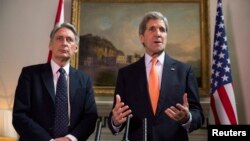The United States and Britain on Saturday discussed imposing more sanctions on Russia, as Ukraine's week-old cease-fire continued to teeter on the brink of collapse.
U.S. Secretary of State John Kerry met his British counterpart, Philip Hammond, in London, saying afterward that President Barack Obama would decide "in the next few days" on potential new sanctions for violations of the truce.
"So far, Russia and the separatists are only complying in a few areas selectively," Kerry said. "Not in Debaltseve, not outside Mariupol and not in other key strategic areas. That is simply unacceptable. If this failure continues, make no mistake, there will be further consequences, including consequences that would place added strains on Russia's already troubled economy.''
Kerry said he was confident that the U.S. and its allies would respond with "serious" measures. Arming Ukrainian forces is another possibility Washington is considering, he added.
As Ukraine's military and the Russia-backed separatists continued to trade accusations of attacks, the two sides carried out a prisoner exchange Saturday as agreed to under the cease-fire. The trade was 139 Ukrainian troops for 52 rebels and took place near the village of Zholobok. Some of the soldiers freed showed signs of injury, walking with crutches to the site of the release.
Rebels said the prisoners included some troops captured in the strategic railroad town of Debaltseve, which was overtaken by separatists this week in the worst breach of the U.N.-backed cease-fire.
Earlier Saturday, Kerry said Moscow had engaged in "an absolutely brazen and cynical process" over the past few days. He told reporters that the U.S. and its allies were not going to go along with what he said was Russia's "extraordinarily craven behavior."
"There is no secret to any of us, not in this age of all kinds of visibility and technical means and satellites and the ability to watch what people are doing," he said. "We know to a certainty what Russia has been providing to the separatists, how Russia is involved with the separatists and the ways in which Russia has cynically been willing to go to — even lead an effort [against Ukraine] in the U.N., even simultaneously as it is continuing to do land-grabbing in Ukraine."
Ukrainian President Petro Poroshenko on Friday accused the Kremlin of direct involvement in the sniper deaths of anti-Russian protesters last year in Kyiv's Maidan Square.
He made the charge on the first anniversary of the killings, saying Ukraine's security services have the evidence. The Russian Foreign Ministry called the accusation "ravings" and "madness."
On Saturday, Kerry issued a statement on the Maidan protests, saying the United States was united with Ukraine in remembering the sacrifices of the protesters. He highlighted his visit to Kyiv in the aftermath of the protests, saying what inspired him most "was the Ukrainian people themselves, who are striving for a democratic and European future in the face of adversity and Russian aggression."
The White House, French President Francois Hollande and German Chancellor Angela Merkel all warned Friday that Moscow faced higher costs and more isolation if Russian-backed separatists continued violating the cease-fire in eastern Ukraine.
A Ukrainian military spokesman said Russia was still moving military equipment into Ukraine, including tanks in the direction of Novoazovsk, a rebel-held town near Mariupol.
U.S. Vice President Joe Biden spoke by telephone Friday with Poroshenko and Ukrainian Prime Minister Arseniy Yatsenyuk. The White House said Biden agreed with both leaders that Russia could not keep hiding behind the false claim that local separatists are solely responsible for the latest military moves in eastern Ukraine.





